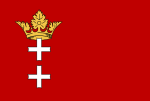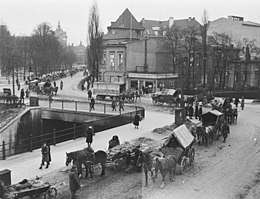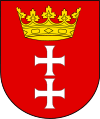Free City of Danzig Government in Exile
The Free City of Danzig Government in Exile (German: Regierung der Freien Stadt Danzig im Exil) or the Free State of Danzig, is a self-declared government in exile which claims sovereignty over the territory of the defunct Free City of Danzig.
Free City of Danzig Government in Exile | |
|---|---|
 Flag | |
Motto: "Nec Temere, Nec Timide" | |
Anthem: Für Danzig / Gdańsku | |
 Territory claimed by the Free State of Danzig (map of modern-day Europe) | |
| Status | Unrecognized state |
| Capital | Berlin, Germany (capital-in-exile) |
| Official languages | German Polish |
| Government | Parliamentary system |
• President of the Senate | Beowulf von Prince |
• Head of Foreign Affairs (Senator) | Ernst F. Kriesner |
| Legislature | Rat der Danziger |
| Government-in-exile | |
• Proclaimed | 13 November 1947 |
| Area | |
• Total | 1,966 km2 (759 sq mi) |
Background

The Free City of Danzig (German: Freie Stadt Danzig; Polish: Wolne Miasto Gdańsk) was a semi-autonomous city-state that existed between 1920 and 1939, consisting of the Baltic Sea port of Danzig (now Gdańsk, Poland) and nearly 200 towns in the surrounding areas. It was created on 15 November 1920[1][2] in accordance with the 1919 Treaty of Versailles after the end of World War I and was under League of Nations protection. The Free City was primarily inhabited by ethnic Germans but the majority fled or were expelled when the territory was incorporated into Poland at the conclusion of World War II.
History
On 13 November 1947, W. Richter, the chairman of the Association of Nationals of Danzig Free State, announced the formation of a government-in-exile for the Free City of Danzig.[3] The government made pleas to the United Nations, calling for official recognition, the deportation of Poles from its claimed territory, and assistance in reestablishing the Free City.[4] Richter also announced that the association would accept a settlement from the international community that would grant them an alternative territory in a center of commerce.[3] The legislative body of the government in exile, the Rat der Danziger (Council of Danzig), was established that year. In 1951 and 1961, it was supposedly recognized in secret by Danzig expatriates as the "legal successor of the Senate of the Free City of Danzig."[5]
Government
The Free State of Danzig government is based in Berlin, Germany. It respects the original Constitution of the Free City of Danzig.[6] The official government website is run by the incumbent Head of Foreign Affairs, Senator Ernst F. Kriesner.[7] The government's legislature takes the form of a parliament, the Rat der Danziger (Council of Danzig), which has 36 members[8] and claims to represent the interests of German Danzigers.[9] Members of the council are elected by Danzig expatriates and their descendants by a mailed-in ballot.[10]
Recognition and relations
A formal letter was sent to the United Nations in 1998 by Senator Kriesner requesting official recognition.[11]
Writing on the lack of official German recognition of the Free City of Danzig Government in Exile, Polish Foreign Minister Władysław Bartoszewski stated that the organization and like-minded Danzig cultural associations were seen in the eyes of the German public as revanchist and politically aligned with the far-right National Democratic Party of Germany.[12]
Claims
The government lays claims to the entire territory once possessed by the Free City of Danzig.[4] It bases the legitimacy of its assertion upon the notion that the Free City of Danzig was a neutral state and that its annexation by Germany in 1939 was illegal; as such, the Allies had no authority in incorporating the city into Poland after World War II.[13] In addition to this, no formal treaty has ever altered the status of the Free City of Danzig, and its incorporation into Poland has rested upon the general acquiescence of the international community.[14]
References
- Loew, Peter Oliver (February 2011). Danzig – Biographie einer Stadt (in German). C.H. Beck. p. 189. ISBN 978-3-406-60587-1.
- Samerski, Stefan (2003). Das Bistum Danzig in Lebensbildern (in German). LIT Verlag. p. 8. ISBN 3-8258-6284-4.
- "Move For New Danzig Territory". The Sydney Morning Herald. London. 14 November 1947. Retrieved 6 November 2016.
- Schoenburg, H. W. (2012). Germans from the East: A Study of Their Migration, Resettlement and Subsequent Group History, Since 1945. Studies in Social Life (illustrated ed.). Springer Science & Business Media. p. 186. ISBN 9789401032452.
- "An Inez denken". Der Spiegel (in German). Gdańsk, Poland. 4 April 1967. Retrieved 6 November 2016.
- von Prince, Beowulf (17 March 2010). "Regierungserklärung" (PDF) (in German). Archived from the original (PDF) on 7 November 2016. Retrieved 7 November 2016.
- Kriesner, Ernst F. "Free State of Danzig: Government-in-Exile". Free State of Danzig. Retrieved 6 November 2016.
- Messenger, David A.; Paehler, Katrin, eds. (2015). A Nazi Past: Recasting German Identity in Postwar Europe. University Press of Kentucky. ISBN 9780813160580.
[...]'Rat der Danzig,' the freely elected council of thirty-six delegates that regarded itself as the parliament of the Free City of Danzig in exile.
- Kuhn, Ekkehard (2016). Flucht Vertreibung Integration: Über das Schicksal der Deutschen nach dem Zweiten Weltkrieg (in German). BoD – Books on Demand. p. 126. ISBN 9783839136461.
- Loew, Peter Oliver (2011). Danzig: Biographie einer Stadt (in German). Gdańsk, Poland: C.H.Beck. p. 250. ISBN 9783406605871.
- Kriesner, Ernst F. "Application for UN Membership". Free State of Danzig. Retrieved 6 November 2016.
- Bartoszewski, Władysław (7 February 2001), Odpowiedź ministra spraw zagranicznych na zapytanie nr 2981 (in Polish), Warsaw, Poland: Ministry of Foreign Affairs, retrieved 7 November 2016
- "Iustitia Omnibus Gedanum- Fair Justice for Danzig: Danzig People have Human Rights also!". Free State of Danzig. Retrieved 6 November 2016.
- Capps, Patrick; Evans, Malcolm David (2003). Asserting Jurisdiction: International and European Legal Perspectives. Hart Publishing. p. 25. ISBN 9781841133058.
External links
- Free State of Danzig (official website)
- Application for UN Membership
- Official website campaign for UN Membership
- EXEKUTIVORGAN DES RATES DER DANZIGER (official Council website)
- Official Council YouTube channel
- 2016 Council elections website
- LEITPOLITIK DES RATES DER DANZIGER/BASIC POLITICS OF THE DANZIG COUNCIL
- Official taxation law
